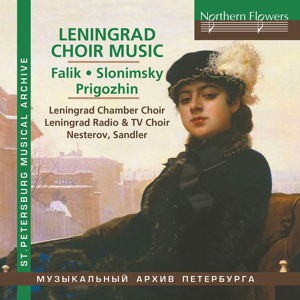
Leningrad Choral Music
Leningrad Radio and TV Choir/Valentin Nesterov
Leningrad Chamber Choir/Grigori Sandler
rec. 1974-1983, Leningrad Studios
Northern Flowers NFPMA99153 [66]
Yuri Falik was born in Odessa and studied at the Leningrad Conservatoire with Rostropovich and Boris Arapov. Amongst much else there are symphonies, Oresteia – a choreographic tragedy (after Aeschylus), string quartets and a Mass for soloists, chorus, and chamber orchestra. In the present case, Falik’s writing for choir steps into the light. The Stranger for mixed choir, to words by Alexander Blok, dates from 1976. It is staccato-delicate, simple and very affecting and relies strongly on its memorable tune. The Two Solfeggios for mixed choir are from three years earlier. The little ‘Prelude’ is a loftily airy piece that probes tonality. The dancing ‘Fugue’ is in the form of a jolly playground rondel. Poetry re-enters with ‘Birds Fly Away Across the Sea’ and there are dreams, tears and contentment in ‘Cowberry Ripening’ and ‘Rusty Fir Trees’. As if to drive out a surfeit of peace and contemplation along comes the Orff-like chatter of ‘Weather’s Noisy, in a Temper’. The five Estonian Watercolours – again from the mid-1970s – are for women’s choir. These miniatures set pastorals by Debora Vaarandi and Johannes Liiv. Once again, Falik has in his sights a dreamy rustic idyll. In achieving his aim, his pacing and execution do not falter. In the last of the group ‘Clouds Floating By’ there is an emphatic passionate animation to set alongside the water-coloured images. Falik’s final contribution to the disc – Triptych for mixed choir - sets words by Vladimir Soloukhin. These three songs return to Russian folksong both contemplative and, in the case of the middle song, ‘The Sun was Setting’ there is vocal attack and anthemic alla-marcia power.
Sergey Slonimsky’s music has been pecked at across five or six Northern Flowers CDs, including two of the symphonies, of which there are no fewer than thirty (1958-2011). The most extensive work here, at approaching twenty minutes, his The Song of Solomon is a “Lyrical fragment” for soprano, tenor, chamber choir, oboe, French horn (an assertive presence), and harp. Surprisingly, this dates from 1975. It is an ardent piece and makes intelligently engaging play with the variety of its forces including instruments used for both colour and tune. Its melodic substance inhabits the same undulating contours as Tippett’s Rose Lake and the second movement of the British composer’s deeply affecting Triple Concerto. At the same time it is, perhaps inevitably given the forces, more spare and less lush. Although different it can now be added to a literature that also includes similarly-centred pieces by Bantock and Grainger. From another world come Slonimsky’s Two Songs to Traditional Words (1967). Of these, ‘My Heart is Sad’ is swayingly melancholy with plenty of contrasted terracing of male and female voices. Delivered with emphatic clapping and furious activity ‘Love Your Wife, Ne’er Beat Her’ would make a poignant companion in concert to Rachmaninov’s catchy ‘You, My Fairness, My Rosy Cheeks’ of the Three Russian Songs.
Luzian Prigozhin was of a generation earlier than Falik (with whom he shares another Northern Flowers CD) and Slonimsky. He died in the decade before the death of the other two showcased here. Tashkent-born Prigozhin has an intriguing catalogue at least if we go by titles: a Robin Hood opera (1972); three symphonies. (1955, 1960, 1970); two each of violin sonatas and string quartets, Stenka Razin for soloists and orchestra (1949); Prometheus Unbound for chorus and orchestra (1960) and much else. His The Cycle for mixed choir (1973) sets words by Alexander Blok – a poet perennially popular among Soviet composers including Yuri Butsko, Boris Tishchenko and Yuri Shaporin. The cycle of the title refers to the sequence of the seasons starting in ‘Autumn’ and ending with ‘Summer’. These four little choral songs are easily digestible and are of cooing sweetness, gaily dynamic and entwined with intermittently Howellsian honeyed ecstasy; not to mention chattering teeth in ‘Autumn’. Prigozhin has no compunction about having learnt from Orff’s Catulli Carmina, especially in the giddy ‘Summer’.
All three composers – less so in the case of Prigozhin – have been numerously served by earlier Northern Flowers discs. The music, as heard here, is the work of two Leningrad choirs both virtuosi at a technical and inspirational level. The liner essay is attributed to Northern Flowers so is almost certainly the handiwork of Eduard Serov and translated to English by Sergey Suslov. In any event information is plentifully supplied and in a well-presented shape.
Rob Barnett
Help us financially by purchasing from


Contents
Yuri Alexandrovich Falik
1. The Stranger for mixed choir; words by Alexander Blok (1976)
Two Solfeggios for mixed choir (1973)
2. Prelude
3. Fugue
Autumn Songs for mixed choir (1970)
4. Birds Fly Away Across the Sea. Words by Dmitry Kedrin
5. Cowberry Ripening. Words by Constantine Balmont
6. Weather’s Noisy, In a Temper. Words by Ivan Nikitin
7. Rusty Fir Trees. Words by Anatoly Zhigulin
Estonian Watercolors for female choir (1976)
8. Poplar and Bird. Words by Debora Vaarandi
9. Swans. Words by Debora Vaarandi
10. After Water. Words by Johannes Liiv
11. The Face. Words by Johannes Liiv
12. Clouds Floating By. Words by Johannes Liiv
Triptych for mixed choir to words by Vladimir Soloukhin (1969)
13. The Sun has Come from Behind the Trees
14. The Sun was Setting
15. At the Marketplace
Sergey Mikhailovich Slonimsky
16. The Song of Solomon. Lyrical fragment for soprano, tenor, chamber choir, oboe, French horn, and harp (1975)
Two Songs to Traditional Words for mixed choir (1967)
17. My Heart is Sad
18. Love Your Wife, Ne’er Beat Her
19. I’ll Tell You Bluntly One Last Time for mixed choir Words by Osip Mandelstam (1974)
Luzian Abramovich Prigozhin
The Cycle for mixed choir words Alexander Blok (1973)
20. Autumn
21. Winter
22. Spring
23. Summer

















